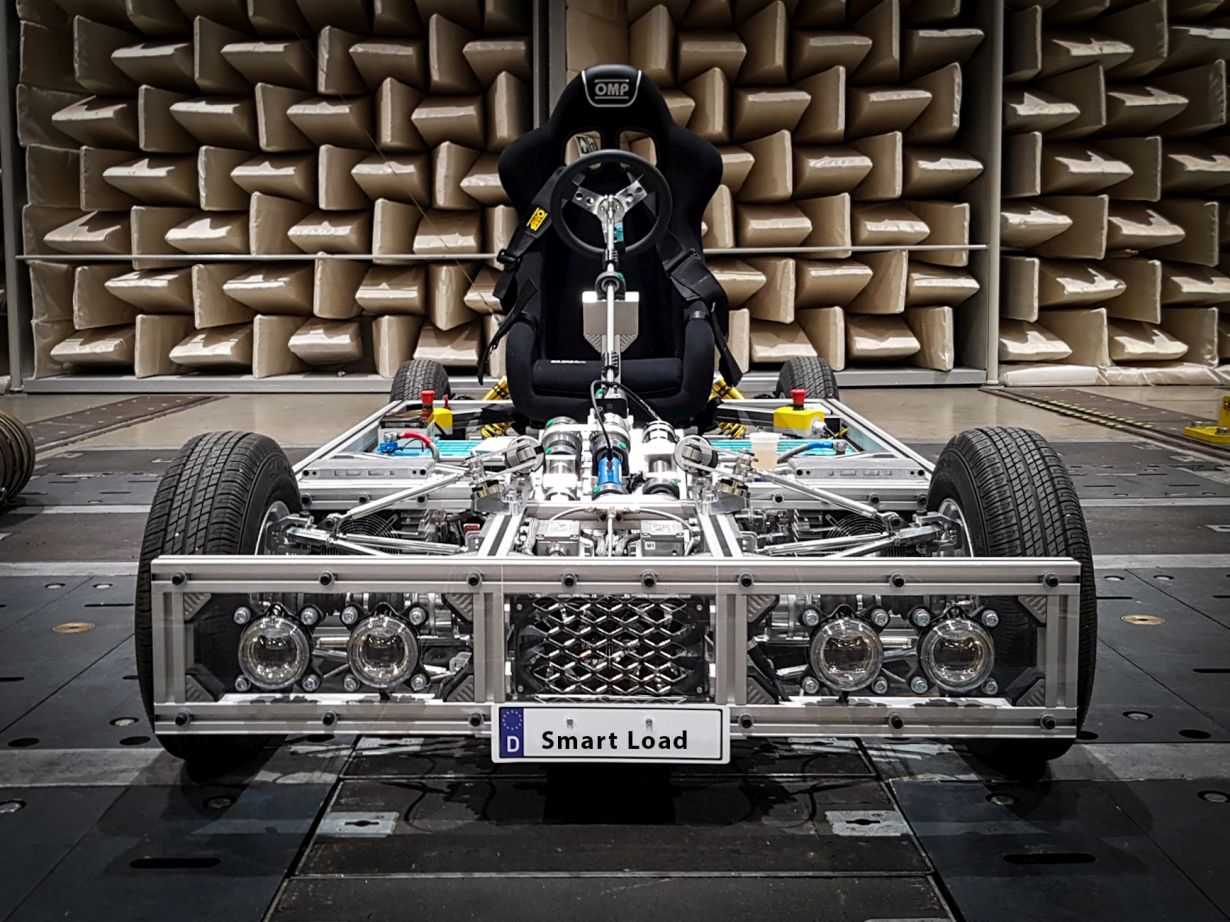Vehicles of the future will increasingly be electric and autonomous, with the aim that they should be as safe and reliable as today's cars. One way to avoid failures is to have important components such as driver and brake assistance systems, which ensure greater safety especially in critical situations, available in duplicate. However, surplus elements are expensive and heavy. Together with partners from science and industry, researchers at Karlsruhe Institute of Technology (KIT) are looking for other options in the SmartLoad project.
In aircrafts that are already self-flying to a great extent, it is common to install all safety-relevant systems in duplicate. The project partners now want to find ways to detect damage in cars early instead in order to manage imminent threats. “In the SmartLoad project we want to develop completely new methods of fault prevention and prediction,” says Albert Albers from the IPEK Institute of Product Engineering at KIT. “Up until now in the development of automated vehicles, series models currently available have been equipped with additional technology with the result that the cars have many more components. Our approach now is to develop vehicles that manage without the baggage of additional components,” says Michael Frey from the Institute of Vehicle System Technology (FAST) at KIT.
For safe and reliable operation, it is necessary to look at the whole vehicle with all its mechanical and electronic components, as well as their interaction with the driver, according to Frey. “In the SmartLoad project we are testing this approach using steering assistance as an example. We are using a drive that individually controls each wheel. Because whereas normal power steering consists of a motor that helps the driver turn the steering wheel, the wheels are now controlled differently on the left and the right which makes steering immediately easier.” This allows for a failure of the power steering system to be compensated for without having to install the same system twice like before.
What is more, electric and self-driving vehicles in which all four wheels are individually driven and steered can perform entirely new maneuvers. “It’s obvious that previous standard tests that are based on driving cycles are not suitable for testing these cars,” says Albert Albers. The aim here is for test stations to provide a solution; while they test individual components, they lead them to believe that they are installed in a vehicle that is currently doing a test drive – for example through the Black Forest. The project partners have separate test stations. These are connected within the national “XiL-BW-e” laboratory network for electric mobility, which means they can show in real time all aspects that are relevant for vehicle development.
This is how maximum loads on individual components as well as error chains of the subsystems involved could be determined, for example failure of a drive during emergency braking when the car is cornering. In the project, researchers can use a total of seven test stations in the XiL network in Karlsruhe, Stuttgart and Wangen. New electronic components will then be developed based on the test results. “Our ultimate goal is to make automatic vehicles less complex and, as a result, more robust,” says Frey. “And, of course, fewer components means lower costs and a lower weight, which would be beneficial for the range and would therefore also lead to greater acceptance by the customer.”
The project funded by the Federal Ministry for Education and Research (BMBF) was launched in October. It will be running for three years, during which time a total of eight partners from Baden-Württemberg will contribute their expertise under the direction of AVL Deutschland GmbH. The project idea was developed in the Cluster Electric Mobility South-West research network.
Project partners in “SmartLoad”:
Karlsruhe Institute of Technology:
- FAST – Institute of Vehicle System Technology
- IPEK – Institute of Product Engineering
AVL Deutschland GmbH
FZI Research Center for Information Technology
RA Consulting GmbH
Schaeffler Technologies AG & Co. KG
SET Power Systems GmbH
University of Stuttgart, Institute of Electrical Energy Conversion
The Cluster Electric Mobility South-West
130 players from industry and science make the Cluster Electric Mobility South-West one of the most important regional networks in the field of e-mobility. Managed by the e-mobil BW GmbH agency, the cluster aims to drive the industrialization of e-mobility in Germany, and to turn Baden-Württemberg into a major provider of electric mobility solutions. In the four fields of innovation – Vehicle, Energy, Production, and Information and Communication Technology (ICT) – renowned large, medium-size and small businesses, especially from the Karlsruhe/Mannheim/Stuttgart/Ulm region, are connected with one another and with local research institutes. What is more, specialized working groups are dealing with comprehensive topics such as the “internationalization” and “intelligent move” working groups, with the latter focusing on digitalization and automated driving.
More about the KIT Mobility Systems Center: http://www.mobilitaetssysteme.kit.edu
In close partnership with society, KIT develops solutions for urgent challenges – from climate change, energy transition and sustainable use of natural resources to artificial intelligence, sovereignty and an aging population. As The University in the Helmholtz Association, KIT unites scientific excellence from insight to application-driven research under one roof – and is thus in a unique position to drive this transformation. As a University of Excellence, KIT offers its more than 10,000 employees and 22,800 students outstanding opportunities to shape a sustainable and resilient future. KIT – Science for Impact.

